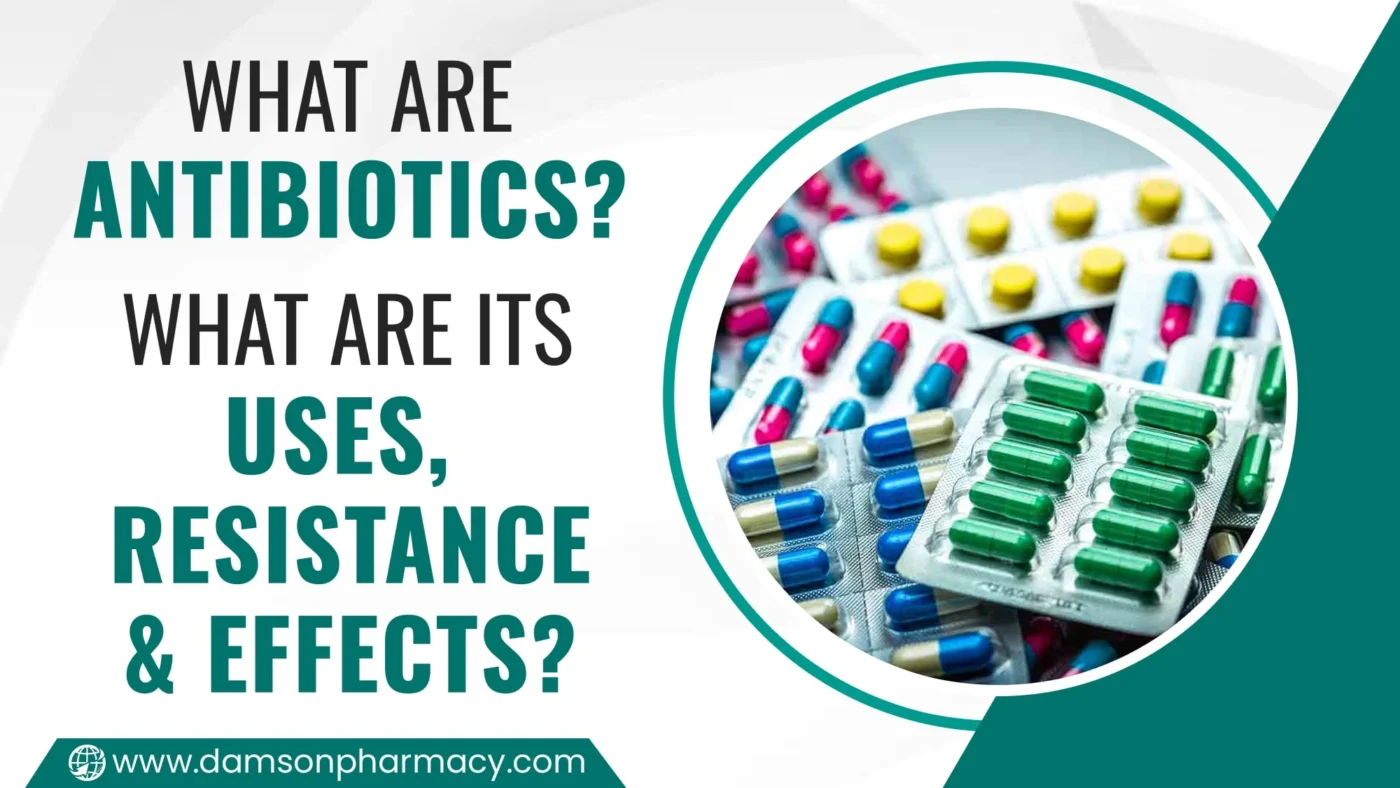What Are Antibiotics? What Are Its Uses, Resistance & Effects?
Antibiotics are very potent drugs prescribed for all infections caused by germs. They inhibit germ growth and kill them. That is how they work. Because of abuse, the potency of these drugs has diminished, but they have saved so many lives. Because of this, it is essential to know how to properly use them and what kinds of side effects they begin to cause.
How Do Antibiotics Work?
They are called selective antibiotics because they kill bacteria cells but not human cells.

Targeting Bacteria
Antibiotics kill bacteria cells but not people cells.
Bacteria Killing
Some antibiotics destroy or interfere with cell walls, killing the bacteria.
Killing Bacteria
Some antibiotics break down or mess with cell walls, which kills the bacteria.
Inhibiting Growth
Other antibiotics interfere with germs and ability to multiply, Which allows the body’s immune system to clear the infection.
Types of Medication
There are many different varieties of antibiotics and each is effective on several types of bacteria. Some of the most common are:
- Cephalosporins
- Fluoroquinolones
- Macrolides
- Penicillins
Why and How Antibiotics Are Used?
They are often used to treat bacterial lung infections such as bronchitis and asthma with antibiotics in order to ease up the symptoms and recover quickly.

Skin Infections
They can reduce swelling and speed up the healing process of various types of skin infections.
Urinary Tract Infections
Most urinary tract infections are caused by bacteria like E. coli, and antibiotics prevent infections that cause pain and problems.
Gut Illnesses
Some drugs can eradicate illnesses from germs living in the gut, such as stomach bacteria. Thus, these can be used to clear up signs and prevent further illness.
Infections within the Teeth
Antibiotics are applied to the infected teeth as they eliminate the occurrence of the disease by killing it and eliminating it.
Why Is It So Crucial to Complete Antibiotic Courses?
It is essential to complete antibiotics, even if you feel better, before the end of the term. If you discontinue medicines too early, some germs may survive. When these germs return, they will make your illness worse. This also makes germs resistant to drugs, making it even more challenging to treat them later on.
You can do your part to help it work as well as it can by following your doctor’s instructions and taking the medicines. This ensures your health and prevents the spread of the “bad” germs resistant to those medicines. It will also help people keep getting these crucial medicines.
What is “Antibiotic Resistance”?
Antibiotic resistance is the situation wherein bacteria evolve to survive despite the antibiotics around them. This happens because common infections become more challenging to treat, causing longer illnesses and increasing healthcare costs.
One of the factors that have given rise to this phenomenon is overuse and misuse of antibiotics, poor hygiene, and incomplete treatment courses. It is, therefore, a problem of significant public health concern.
Consequences of Antibiotic Resistance
It has several effects.
Longer Illnesses
More and more people are becoming resistant to antibiotics, which is bad for public health. In that case, someone can be sick for a much longer time, and concerns also go up.
Higher Medical Costs
You might have to visit the doctor more often and get more treatments.
Increased Mortality
More people are dying of infections that were once easy but now have turned out to be dangerous and could kill them.
How to Use Antibiotics Wisely?
Take antibiotics only as directed by your doctor. Of course, you must complete a whole course of drugs. Avoid self-medication and drug reusing. This makes treatment less effective and exposes bacteria to resistance to antibiotics.
In cases of influenza or a cold, children should know that antibiotics fight bacterial diseases, not viruses. They would carry out their duties much better if they learned how to take drugs properly and taught others to do the same.
What Antibiotics Can Do to You?
It may make you feel unwell, lead to diarrhea, or cause stomach pain. In some individuals, allergic reactions such as rashes and swelling can occur. Be especially sensitive to how your body feels, and if it worsens, be sure to let the doctor know.
Some of the possible side effects that the drugs might cause are not very scary, including developing a Clostridium difficult infection. Before taking antibiotics, one should discuss any side effects that may occur with the doctor.
Conclusion
This means a lot in today’s medicine because it helps eradicate bacterial infections. However, man has become very resistant to drugs, which is terrible for public health. So, if we use medicines with care and understand what they are doing, they will work better for generations coming.
You should talk to a doctor or nurse before taking antibiotics because they will help you figure out just what kind and how much you need to get the best care. Remember, antibiotics must be appropriately used if they continue to work and not create antibiotic-resistant bacteria.
References
Acknowledgment:
Damson Pharmacy only refers to credible, authoritative sources for our content. If you’re curious about how we ensure the integrity of our content, we encourage you to read our Content Information Policy.

